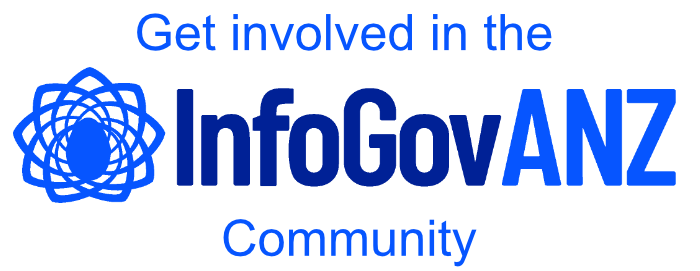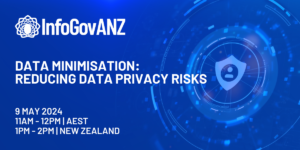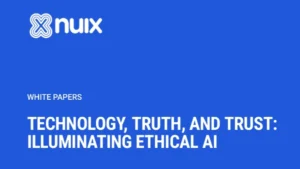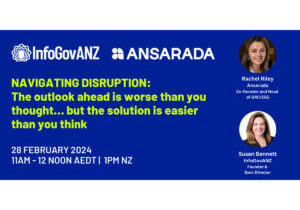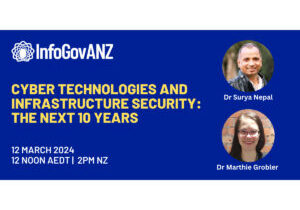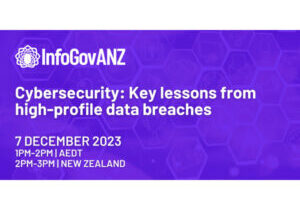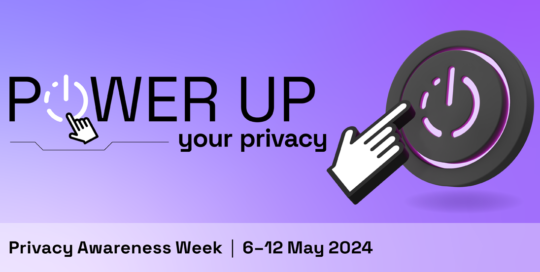InfoGovANZ is a community of international professionals across the data and information sphere - Data Privacy, AI and Ethics, Cyber and Information Security, eDiscovery, ESG, Data and Infonomics, FOI, Information Governance, Legal, Records Management, Risk and Compliance - with a multi-disciplinary focus to collaborate and share best practices and promote global information governance innovation.
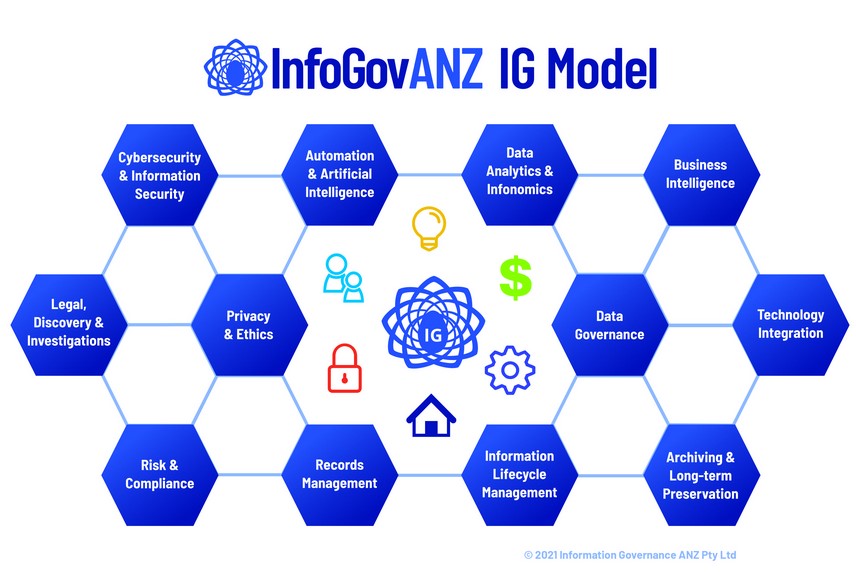
Information Governance is the policies, procedures, technologies and culture that organisations build to maximise the value of information while minimising associated risks and costs – see more in our InfoGovANZ IG Industry Report
Contribute, share your knowledge, and learn from other members of the community by joining InfoGovANZ. Become part of a growing network of like-minded professionals covering the wide range of disciplines contributing to information governance. As a member, you will receive the latest updates, be the first to know about our events and receive member-only discounts.
Latest Updates
Data Minimisation: Reducing Data Privacy Risks
Thursday, 9 May 2024, 11am – 12noon AEST Join us to learn more about why data minimisation is key to reducing data privacy risks and how to embed data minimisation in your organisation. This virtual webinar will cover: High-profile data breaches, over-retention of data, and global regulatory trends What are […]
Read MorePrivacy Awareness Week 2024
Privacy Awareness Week (PAW) 2024 is running from 6-12 May. The theme this year asks people, organisations and government agencies to ‘power up your privacy‘. This sits under the overarching theme of Privacy and technology: Improving transparency, accountability and security. PAW 2024 provides a great opportunity to consider what you can do […]
Read MoreFive Key Lessons from Robodebt for AI and Technology Projects
Australia’s Robodebt scandal provides some critical lessons for boards/governing authorities and senior executives implementing artificial intelligence (AI) and technology in both the public and private sectors. The emergence of AI governance guidance and standards, such as AS ISO/IEC 42001:2023 and NIST’s AI Risk Management Framework, are helpful tools for organisations […]
Read MoreDigital ID Bill passes Senate
The Digital ID Bill 2023 and Digital ID (Transitional and Consequential Provisions) Bill 2023 have now passed the Senate and are expected to progress to the House of Representatives in the next sitting period this year. The key amendments made to the Exposure Draft of the Digital ID Bill […]
Read MoreAI Governance now mandated for U.S. Federal Government Agencies
On 28 March 2024, President Biden issued a Memorandum establishing new agency requirements and guidance for AI governance, innovation, and risk management, including through specific minimum risk management practices for uses of AI that impact the rights and safety of the public. Specific actions required by agencies include: Designating a Chief […]
Read MoreTechnology, Truth, And Trust: Illuminating Ethical AI
This Nuix whitepaper explores ways in which creators and users of complex AI solutions can mitigate the many ethical risks posed to organisations and society, without undermining AI’s profound ability to help solve our thorniest and most pressing challenges. As the pace of technological change increases, so does the importance of achieving a […]
Read MoreRecent Resources
See our latest resources including webinar recordings - click for complimentary downloads or to place an order.
Navigating Disruption: Outlook and Solution – Webinar Recording
Watch this recording for an insightful webinar where we delve into current trends, sentiments, and challenges organisations face in building their resilience.
- Key Trends and Takeaways: Explore the critical trends, from ESG risks to cyber threats, emphasising their impact on reputation and compliance costs.
- Board’s Role in Building Resilience: Understand the pivotal role of the Board in building a resilience culture and debunk misconceptions about cybersecurity.
- Practical Strategies for Integration: Discover practical strategies to seamlessly integrate resilience into the risk management framework and explore the importance of accurate data for ESG success.
Cyber Technologies and Infrastructure Security: the next 10 years – Webinar Recording
Cost: Free for Members (access the recording here)
Non-member $80 + GST (become a member)
This webinar event will cover the following:
- Explain how the current cyber technologies will rapidly evolve and how organisation technology platforms will look in 10 years;
- Look at the role and use of quantum computing and emerging technologies in improving security and resilience;
- Explain why human-centric security is crucial to building cyber resilience and protecting infrastructure
Cybersecurity: Key lessons from high-profile data breaches – Webinar Recording
Cost: Free for Members
Non-member $55 + GST
In this webinar we covered:
– Causes and learnings from Optus, Medibank, Latitude and HWL Ebsworth data breaches
– Responding to data breaches – the do’s and don’ts
– Implications of Federal Court judgment rejecting the claim by Optus for legal professional privilege over the Deloitte report into the September 2022 data breach
– Key steps to minimise data breaches and improving information security
View DetailsFor the first time in history, the world's leading experts on accelerating technology are consistently finding themselves too conservative in their predictions...
- Steven Kotler, author, journalist & Director of Research, the Flow Genome Project -
